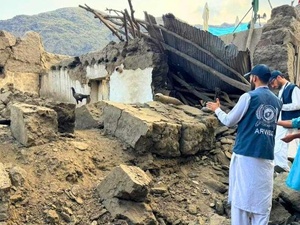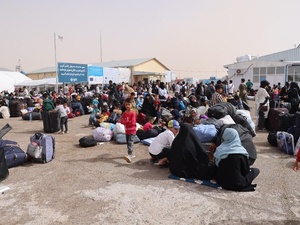Afghan refugees in Iran start returning home under new initiative
Afghan refugees in Iran start returning home under new initiative

At UNHCR's Takhta Baig registration centre in Pakistan, thousands of Afghan refugees wait for improved security before completing the trip home.
DOGHAROUN, Iran, April 9 (UNHCR) - Afghan refugees in Iran began returning home today under a UN refugee agency plan to help up to 400,000 refugees repatriate this year. The repatriation took place as violence erupted in several Afghan border regions, delaying the return of thousands of Afghans from neighbouring Pakistan.
So far, 146 Afghan refugees in Iran have returned via the Dogharoun crossing point, near Iran's eastern city of Mashad. "It's a moderate start, not unlike the early days of repatriation from Pakistan," said UNHCR spokesman Kris Janowski in a response to a question at a press briefing in Geneva.
Iran hosts more than 1.5 million Afghan refugees. Today's repatriation is the result of a tripartite agreement signed April 3 between the governments of Afghanistan, Iran and UNHCR.
But amid the hopes of repatriation, security problems persisted. UNHCR had to re-route more than 120 returning Afghans via the Dogharoun crossing instead of sending them overland directly to Zaranj, the capital of Afghanistan's Nimrouz province, where fighting has reportedly erupted.
In eastern Afghanistan, refugee returns via the Khyber Pass from Pakistan have also been interrupted since Monday by a bomb explosion and roadblocks erected by local farmers along the road from the Torkham crossing to Jalalabad. This shut down a UNHCR distribution centre, and prevented UNHCR staff from reaching the Mohmandar encashment centre where returnees from Pakistan receive their cash grants.
The roadblocks and tensions in eastern Afghanistan have forced some 18,000 Afghans to delay their return after registering at UNHCR's Takhta Baig centre, outside Peshawar, over recent days.
"We stopped the transport of refugees because of the violence," explained UNHCR's Janowski. "Our operations [at Takhta Baig] will resume once the violence subsides."
The UN refugee agency hopes security can be restored throughout the region in the next few days so that Afghans can again travel home via the main Torkham crossing.
In the meantime, a number of border crossings from Pakistan are still open - UNHCR's registration centre at Mohamand Ghat, north of Torkham, and a centre in Balili in Baluchistan province that opened on Monday. Afghans continued to cross homewards from adjacent crossing points.
On repatriation plans in Iran, Janowski said, "We'll be facilitating the repatriations as and when the need arises, perhaps even daily."
Under the tripartite agreement, Afghan refugees in Iran can register at one of nine centres in Iran before being transported up to the border on government-hired buses. There they are briefed on the dangers of landmines and security conditions in Afghanistan.
Once at the frontier, they board buses organised by the International Organization for Migration (IOM), which carry them to the provincial capital of their choice. Returnees receive food, plastic tarpaulins, stoves, blankets and $10 per person for transport to their home areas.
Elsewhere, displaced Afghans living in squalid island camps in the Pyandj river along Afghanistan's border with Tajikistan began returning home on Monday. Barges carried them several hundred metres to the neighbouring bank, where they boarded IOM-chartered trucks that took them home. More than 500 Afghans left the island encampments on Monday in the operation to help some 9,000 Afghans living at Site 9 in the Pyandj river return home.
To keep the repatriations on track, UNHCR announced at the press briefing that Sweden had pledged $7 million for the Afghan operations. "The High Commissioner appreciates Sweden's staunch support and hopes other donors will follow suit," said Janowski.








